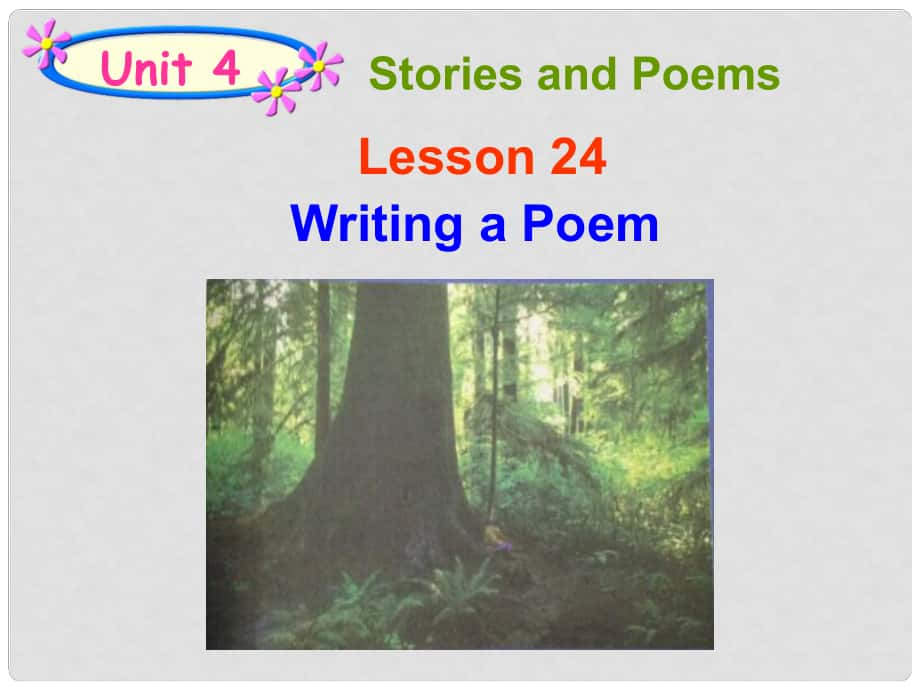《河北省唐山市曹妃甸區(qū)南堡開(kāi)發(fā)區(qū)九年級(jí)英語(yǔ)全冊(cè) Unit 4 Stories and Poems Lesson 24 Writing a Poem課件 (新版)冀教版》由會(huì)員分享�����,可在線閱讀����,更多相關(guān)《河北省唐山市曹妃甸區(qū)南堡開(kāi)發(fā)區(qū)九年級(jí)英語(yǔ)全冊(cè) Unit 4 Stories and Poems Lesson 24 Writing a Poem課件 (新版)冀教版(15頁(yè)珍藏版)》請(qǐng)?jiān)谘b配圖網(wǎng)上搜索。
1���、Unit 4Stories and Poems Lesson 24 Writing a PoemWordsfairytalecharacterplothumorousn. 仙子����;小精靈仙子����;小精靈n. 故事;童話故事�;童話n. (小說(shuō)��、戲劇當(dāng)中的小說(shuō)���、戲劇當(dāng)中的)人物;特點(diǎn)����;特色人物;特點(diǎn)��;特色n. 情節(jié)情節(jié)adj. 幽默的��;詼諧的幽默的����;詼諧的Whats the difference between poem and story?poemformatrhymeshort lengthmeaningsyllablestorycharactersplotsettingconflictresolu
2��、tionlong lengthWhich do you prefer to write poems or stories? 1P61Read the lesson and write true (T) or false (F).1. Danny learned how to write songs last week. ( )2. Danny likes reading stories. ( )3. Danny thinks stories are easier to write. ( )1. At the beginning, I was afraid to try writing a po
3��、em.起初�����,我不敢嘗試寫(xiě)詩(shī)歌��。起初,我不敢嘗試寫(xiě)詩(shī)歌�。at the beginning “ 開(kāi)始時(shí);起初開(kāi)始時(shí)��;起初”�����,at也可以換成也可以換成in�����。They were cheerful in/at the beginning.開(kāi)始時(shí)�����,他們情緒高漲����。開(kāi)始時(shí),他們情緒高漲���。后接后接of短語(yǔ)時(shí)���,只能用短語(yǔ)時(shí)�����,只能用at the beginning����。A policeman stood at the beginning of the street.一位警察站在街道的起點(diǎn)處�����。一位警察站在街道的起點(diǎn)處�����。2. Then my teacher encouraged me to write a humorous
4�����、 poem because I am always saying funny things.后來(lái)�����,老師鼓勵(lì)我寫(xiě)幽默的詩(shī)��,因?yàn)槲铱偤髞?lái)�����,老師鼓勵(lì)我寫(xiě)幽默的詩(shī)��,因?yàn)槲铱偸钦f(shuō)一些有趣的事情���。是說(shuō)一些有趣的事情�。always副詞�����,表示副詞�����,表示“總是�����,一直總是���,一直”����,常用,常用于一般現(xiàn)在時(shí)���,表示經(jīng)常性的行為和動(dòng)作����。于一般現(xiàn)在時(shí)�,表示經(jīng)常性的行為和動(dòng)作。always也可以用于進(jìn)行時(shí)����,表示某種思想、也可以用于進(jìn)行時(shí)�����,表示某種思想����、情緒或行為反復(fù)發(fā)生��,且含有不滿��、厭惡、情緒或行為反復(fù)發(fā)生�����,且含有不滿����、厭惡、煩躁���、感嘆等感情色彩�����。煩躁����、感嘆等感情色彩����。You are always making troubl
5、es���!你怎么老找麻煩�!你怎么老找麻煩!2Use “must” to complete the dialogues. Then practice the dialogues with a partner.Son: Mum, may I watch TV for a while?Mum: No. Its 10:00 in the evening. You_ go to sleep now.Student: Sorry, Mr. Hill. I am late for school.Headmaster: Come to school on time tomorrow. As a student,
6��、you_ follow the rules of the school.Policeman: You_ slow down when you pass by a school.Driver: Sorry, sir!mustmustmustTime for reflectionat the beginningalways開(kāi)始��;起初開(kāi)始���;起初總是�;一直總是��;一直. 根據(jù)漢語(yǔ)提示完成句子�����。根據(jù)漢語(yǔ)提示完成句子�����。1. His _ (幽默的幽默的) remark lightened the tense atmosphere. 2. She was like a princess in a _ _ (童話
7��、童話). 3. I really liked the script and the_(角色角色). 4. He began to tell me the_ (情節(jié)情節(jié)) of his new book. 5. He is _ (總是總是) telling lies.characterhumorousfairy taleplotalways. 翻譯下列句子���。翻譯下列句子����。1. 我們七月初要去日本�。我們七月初要去日本。Were going to Japan at the beginningof July. 2. 我經(jīng)常鼓勵(lì)學(xué)生多閱讀���。我經(jīng)常鼓勵(lì)學(xué)生多閱讀��。I often encourage my students to read more.3. 我決定對(duì)他的生平做些研究����。我決定對(duì)他的生平做些研究�。I decide to do some research about his story. Preview the words and expressions in Lesson 25.A Humorous Poem: Write a humorous poem. Think about what you think is funny and try to write a poem that will make people laugh.
 河北省唐山市曹妃甸區(qū)南堡開(kāi)發(fā)區(qū)九年級(jí)英語(yǔ)全冊(cè) Unit 4 Stories and Poems Lesson 24 Writing a Poem課件 (新版)冀教版
河北省唐山市曹妃甸區(qū)南堡開(kāi)發(fā)區(qū)九年級(jí)英語(yǔ)全冊(cè) Unit 4 Stories and Poems Lesson 24 Writing a Poem課件 (新版)冀教版

